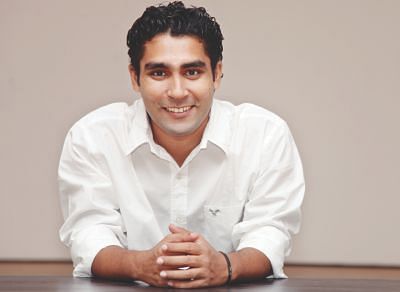The man in the crowd

On a chilly December day in 2009, the second day of the release of the film “Third Person Singular Number”, a young man pushed and elbowed hundreds of others at Dhaka's Balaka cinema hall to reach out to his favourite director, Mostofa Sarwar Farooki, looking for an opportunity to work with him. He was given a phone number of an assistant, where he kept prodding for a couple of years with no success.
Less than five years later, he was at the same venue, for the release of another Farooki film, still being pushed around by enthusiastic fans. But this time, he was on the other side: he was standing beside Farooki and the cast of “Pipra Bidya”, and though people didn't know him by face before the movie, it was he, who the film revolves around –a choice The Hollywood reporter termed as 'a casting coup', not forgetting to hail the non-professional actor as 'utterly natural'.
“I wanted to be a poet,” a shy, rather timid Noor Imran Mithu said. “I wanted to tell stories; but then I saw people were moving more from literature to the visual media, and I changed my mind – I wanted to be a filmmaker.” He kept on trying the assistant's number he got from Farooki, and in the meanwhile continued to make TV ads and assisted directors in TV plays, until he was asked to interview to be an assistant director for Farooki's 2012 film “Television”, got selected, and was a part of the team. But it still was a shock to Mithu when his mentor asked him to start preparing for acting in a film. “It's not just any role; like in Tarkovski's 'Pianist' the camera follows the protagonist, my role was similar in terms of importance,” his eyes gleamed in excitement. “It's been fascinating; it's like I took a journey, in another person's identity. I felt their frustration, despair, angst, and also hope and love. At times I was me, at times I was not.”
So, the acting bug has bitten Mithu? Perhaps. “I think being an actor lets you live many lives in one lifetime; you become one person one day, and then fit yourself in another's man's shoes the next. If I get a good offer, I would love to take that journey again,” he says. And is stardom catching up? “A few people have begun recognising me now. I was standing in line at the passport office the other day, and some people looked at me inquisitively; to be honest, I'm still not comfortable with that, although I greatly enjoy watching their reactions.”
But the real gratitude strikes him elsewhere. “I am so blessed my work has reached so many people. Peyman Moaadi (the protagonist of Asghar Farhadi's “A Separation”) heartily praised my work at a festival, and boss (Farooki) came and told me “You're the most unfortunate actor. I have to hear all the praise for you!” A grateful Mithus adds, “So many actors work all their life and never get the exposure; I'm so grateful for this.”
But he hasn't lost focus from his dreams. “I want to make films; that's my ultimate goal. I want to tell stories. I'm the man in the crowd; I love seeing life from up close. I've spent at least five days in each 52 districts of the country. I've fallen asleep at many a rail station and park bench in this country, just to observe people and their stories. I've worked in NGOs where I've lived with the most grassroots people. I want to bring that all out. Start with making a few TV plays, and then a film.”

 For all latest news, follow The Daily Star's Google News channel.
For all latest news, follow The Daily Star's Google News channel. 



Comments